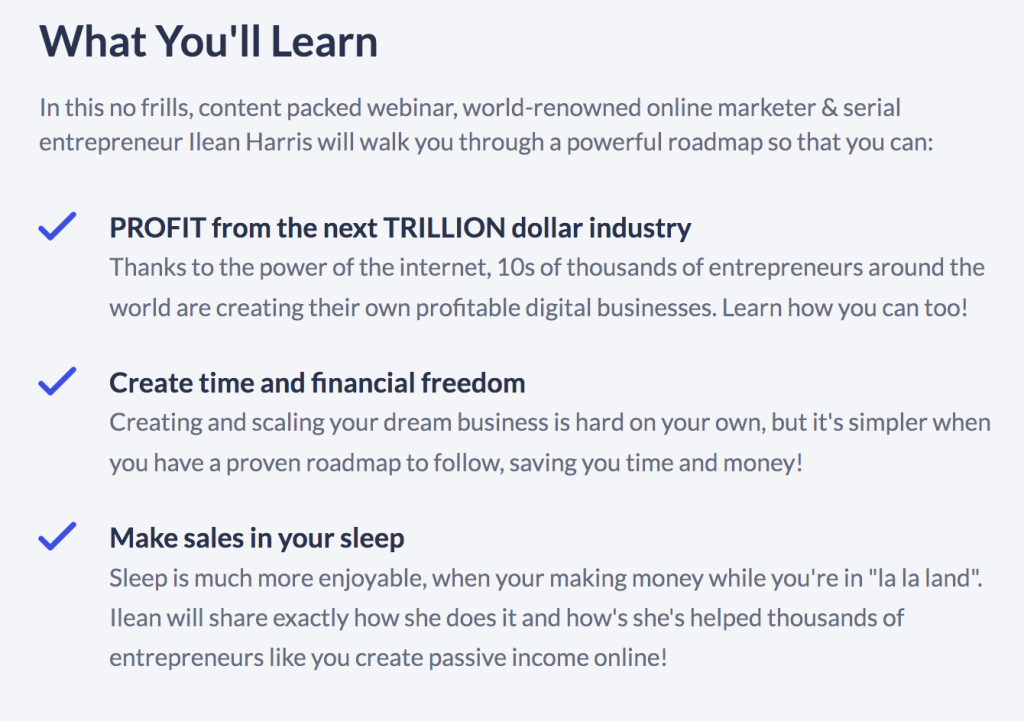This post is all about business ideas.

From Passion to Profit: Turning Your Hobby into a Successful Business Idea
Do you have a passion or hobby that you love? Have you ever considered turning it into a profitable business idea?
When I got started, I had no online followers but I had a huge idea.
And that is all you need sometimes- an idea you are passionate about.
I can testify to that from personal experience after taking my ideas and turning them into an online business that serves clients in Spanish & English in over 20 countries and has grow to over 100,000 email subscribers.
You can do the same but it won’t happen by accident.
You need a strategy that works and that is what I am sharing with you in this blog post!
Check out the entire post for great info, videos, resources, and more!
Many successful businesses started out as hobbies or passions, and with the right strategy, you can turn your passion into a thriving business.
Business ideas
Here are some steps to help you turn your hobby into a successful business idea:
- Assess the market demand: Before you dive into turning your hobby into a business, research the market demand for your product or service. Is there a need for what you offer? Who are your target customers? What are they willing to pay for your product or service?
- Evaluate your skills and resources: Assess your skills, knowledge, and resources to determine if you have the necessary tools to turn your hobby into a business. Do you have the time, money, and expertise to start a business? Can you handle the demands of running a business while continuing to enjoy your hobby?
- Develop a business plan: Create a business plan that outlines your goals, target customers, marketing strategies, pricing, and financial projections. A business plan will help you stay focused, track your progress, and make informed decisions.
- Test your idea: Test your idea by offering your product or service to a small group of customers or friends. Gather feedback and make adjustments before launching your business to the wider market.
- Build your brand: Build a brand that resonates with your target audience. Develop a unique name, logo, website, and social media presence that reflects your passion and expertise.
- Market your business: Develop a marketing strategy that targets your ideal customers. Use social media, email marketing, content marketing, and other tactics to attract and retain customers.
- Monitor your progress: Track your progress and make adjustments as needed. Use analytics tools, customer feedback, and financial reports to evaluate your performance and make informed decisions.
Turning your hobby into a profitable business idea can be a rewarding and fulfilling journey.
With the right strategy, skills, and resources, you can turn your passion into a successful business that brings you joy and financial stability.
Remember to assess the market demand, evaluate your skills and resources, develop a business plan, test your idea, build your brand, market your business, and monitor your progress.
Check out business ideas for women here now.
How to turn your passions and business ideas into a digital course
Turning your passions into a digital course can be a fulfilling way to share your knowledge and expertise with others while also creating a potential source of income.
Here are some steps you can follow to create a successful digital course:
- Identify your topic: Start by identifying the specific area of your passion that you want to teach. What knowledge or skills do you possess that others might be interested in learning?
- Define your target audience: Determine who your target audience is and what their needs and goals are. Understanding your audience will help you create content that resonates with them and meets their needs.
- Research your topic: Conduct research on your topic to ensure that you have a thorough understanding of the subject matter. This will also help you to identify gaps in existing resources and to determine what unique perspective or value you can offer.
- Create an outline: Create an outline of your course that includes key concepts, topics, and lessons. This will help you to organize your content and ensure that you cover all the necessary material.
- Choose a platform: Choose a platform to host your course. There are many options available, including Udemy, Teachable, and Thinkific.
- Create your content: Create your course content, including videos, slides, and any other materials you plan to use. Make sure your content is engaging and easy to follow.
- Test your course: Test your course with a small group of beta testers to get feedback and make any necessary adjustments before launching.
- Launch your course: Launch your course and promote it to your target audience through social media, email marketing, and other channels.
- Continuously improve: Continuously gather feedback from your students and make improvements to your course based on their feedback.
Remember, creating a successful digital course takes time and effort, but it can be a rewarding experience that allows you to share your passion and expertise with others.
Learn more about online courses here now.
How to turn your passions and business ideas into a coaching business
Turning your passions into a coaching business can be a great way to help others while also creating a fulfilling career.
Here are some steps you can follow to create a successful coaching business:
- Identify your area of passion: Start by identifying the specific area of your passion that you want to coach in. What knowledge or skills do you possess that others might be interested in learning? What areas of expertise do you have that can benefit others?
- Define your target audience: Determine who your ideal client is and what their needs and goals are. Understanding your target audience will help you create coaching programs that resonate with them and meet their needs.
- Get certified and trained: Consider getting certified or trained in coaching if you haven’t already done so. This will give you the credibility and expertise to attract clients and deliver results. I am not certified but I have a ton of results that give me credibility and an MBA which is helpful in the business world. In other words, there are many ways to gain training and expertise. Do not limit yourself to one way.
- Build your brand: Create a brand that communicates your values, expertise, and unique selling proposition. This includes developing a brand name, logo, website, and social media presence.
- Develop coaching programs: Develop coaching programs that meet the specific needs and goals of your target audience. This can include one-on-one coaching, group coaching, online courses, workshops, and retreats.
- Set your pricing: Set your pricing based on the value you provide and the market rates for coaching services. Consider offering introductory rates or packages to attract new clients.
- Build relationships: Build relationships with potential clients and referral sources by attending networking events, participating in online communities, and collaborating with other professionals in your industry.
- Market your coaching business: Develop a marketing plan to promote your coaching services to your target audience. This includes leveraging social media, email marketing, content marketing, and paid advertising.
- Continuously improve: Continuously gather feedback from your clients and make improvements to your coaching programs based on their feedback.
Remember, building a successful coaching business takes time and effort, but it can be a rewarding experience that allows you to make a positive impact on the lives of others while pursuing your passions.
How to promote your business ideas and passions on auto-pilot with evergreen webinars
Evergreen webinars can be an effective way to promote your business ideas and passions on autopilot, allowing you to reach a wider audience and generate leads and sales even when you’re not actively promoting your business.
Learn more about webinars here.
Here are some steps you can follow to create and promote evergreen webinars:
- Choose your topic: Start by choosing a topic that aligns with your business ideas and passions. Make sure it’s something that your target audience is interested in and that you can deliver valuable insights and knowledge on.
- Create your webinar: Develop a webinar that provides valuable content on your chosen topic. This can include a combination of slides, audio, video, and interactive elements.
- Record your webinar: Record your webinar using a software tool like Zoom or GoToWebinar. Make sure to rehearse beforehand and record in a quiet, distraction-free environment.
- Edit your recording: Edit your recording to remove any mistakes or technical issues and to ensure that the final version is polished and professional.
- Upload your webinar: Upload your webinar to a hosting platform like YouTube or Vimeo. Make sure to optimize your video for search engines by including relevant keywords in the title, description, and tags.
- Create landing pages: Create landing pages for your webinar that include a registration form and a compelling call-to-action. Make sure to highlight the benefits of attending your webinar and to create a sense of urgency to encourage sign-ups.
- Promote your webinar: Promote your webinar through your website, social media, email marketing, and paid advertising. Use targeted messaging and imagery that resonates with your target audience.
- Follow up with attendees: Follow up with attendees after the webinar to thank them for attending, to answer any questions, and to provide additional resources or offers.
- Test and refine: Continuously test and refine your evergreen webinar to optimize its performance and to ensure that it continues to generate leads and sales over time.
Remember, evergreen webinars can be a powerful tool for promoting your business ideas and passions on autopilot, but they require careful planning and execution to be successful.
Keep in mind that creating valuable content that resonates with your target audience is key to driving engagement and conversions.
This post was all about business ideas.








